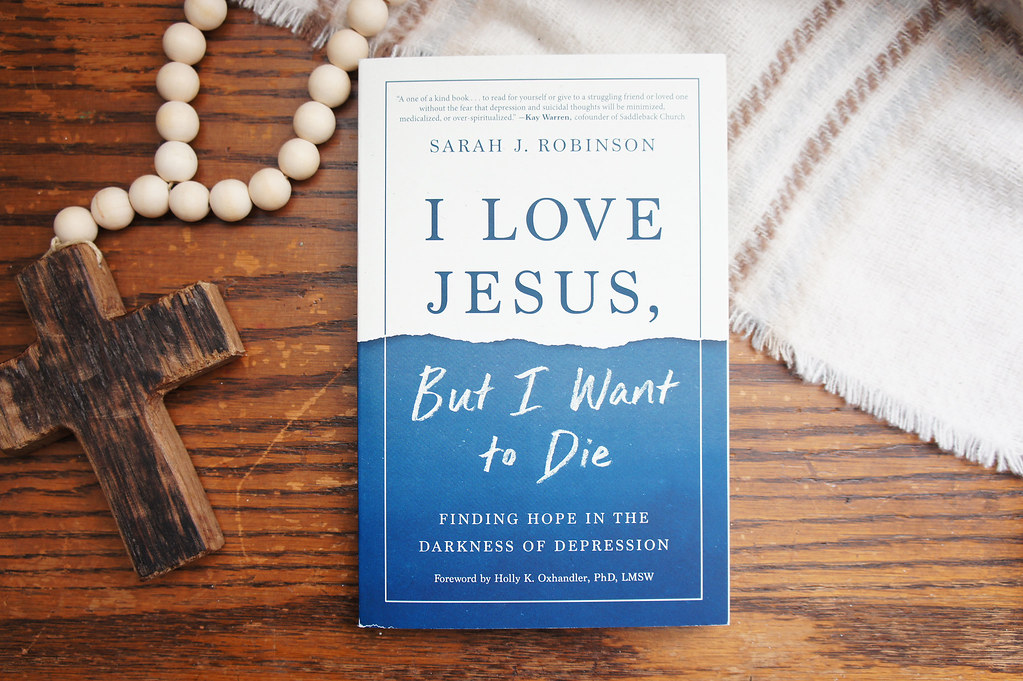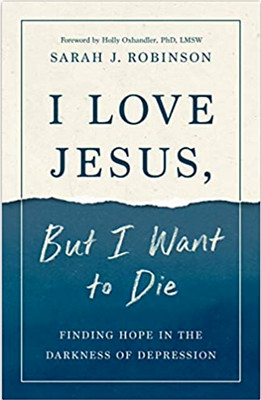I was drawn to Sarah Robinson’s story because she speaks so openly about believing the lie that being depressed or anxious made her a bad Christian. How easy it is for each of us to imagine that if we just had enough faith or prayed the right prayer or got over “that” sin, we would find healing from mental illness or other difficult circumstances. Sarah reminds us what is most true about us, what matters most: We are God’s beloved. Nothing we do can separate us from that love, even in the darkest times. As Sarah says, it’s both really hard and it’s already okay. It’s a grace to welcome her to the farm’s front porch today…
Maybe it was a mistake to come here, I think. I’m not shaking hard enough that anyone would notice, but it might just be a matter of time. At least I asked for my decaf to go.
I weigh my options and wait for my latte. Should I bolt for the safety of my car? If I stay, am I going to get any work done or simply melt into tears?
“It’s been like clockwork: anxiety attacks every afternoon.”
My face is a mask of calm but my gut is in knots. I want to stay and work. I slip the orange bottle from my purse and gulp down a tiny white tablet.
It’s been like clockwork: anxiety attacks every afternoon.
I text my husband, Micah, tell him I’m struggling, then breathe deep and settle at my laptop. It’s going to be okay.
My experience with depression and panic attacks is not new. I’ve lived with mental illness and even suicidal thoughts as long as I can remember. But I have found hope along the way.
I have found tools to beat back the darkness. And I have found peace that God is with me even if I never fully recover from this battle.









One of the richest biblical truths that sustains me on this journey is found in the story of Shadrach, Meshach, and Abednego. These three men were Hebrew exiles in Babylon under the reign of Nebuchadnezzar. When King Nebuchadnezzar demanded that everyone worship a golden statue or be burned alive in a fiery furnace, Shadrach, Meshach, and Abednego refused.
The three men told King Nebuchadnezzar that God was able to deliver them from such death. “But even if he does not, we want you to know, Your Majesty, that we will not serve your gods or worship the image of gold you have set up” (see Daniel 3:16–18).
The king was furious. He had the men tied up and tossed into the furnace. He thought this was the end of the story, until he noticed something strange: the men were walking around in the furnace, untied and apparently unharmed. And a fourth figure was with them who looked “like an angel” or “like a son of the gods” (Daniel 3:25). Many scholars believe that this figure was actually Christ Himself, present with them in the fire.
For those of us who learned this story on a flannelgraph or an episode of Veggie Tales, the message is clear: obey God. The promise is just as obvious: when we are faithful to God, He will rescue us.
But this passage has much more to say than the sanitized Sunday school lessons of our childhoods. We often skip over this painful truth: God didn’t save them from the fire. He didn’t stop them from experiencing it.
Those three young men were full of faith that God was able to deliver them, but they had no idea if He would. They only knew, deep in their bones, that God would be with them through everything.
“My God is able to save me, to heal me, to erase the pain and heartache in a moment. But even if He doesn’t, I refuse to bow to despair.”
And that simple confidence was enough to inspire two of the most powerful words in Scripture: even if.
Though I’ve never stood in a literal furnace, I can relate to that even if experience.
The quiet assurance that gets me through is this: my God is able to save me, to heal me, to erase the pain and heartache in a moment. But even if He doesn’t, I refuse to bow to despair.
Even if I’m never fully delivered, I know that God is good and is present in my pain.
Even if I never get better and the black dog of depression hounds me till the day I die, Christ Himself is with me in the midst of the flames.
Most Christians are used to seeing stories of triumph look a certain way: God vanquishes the Enemy and everyone lives happily ever after. We’re taught that the things of God are tidy and certain. Good people are blessed. Bad people are punished.
But that’s not the truth and beauty of the gospel. At best, it’s a fairy tale. At worst, it’s a sham sold by dishonest people looking to gain something.
But I can promise you this: though we have bleak and hard and anxious days, ours are still stories of triumph. Ours are still stories of transformation. And even though Shadrach, Meshach, and Abednego didn’t have a single hair singed, they surely came out of the fire changed. And so do we.
In the fire, we learn that hope can’t rest solely on the actions of God, on miraculous healings, or on answers to mysteries we can’t comprehend.
Instead, our hope rests on the character of a God who is love, who somehow brings beauty out of the ugliest ashes. We don’t have to be healed, we don’t have to be on the other side of it, to know that He’s good and He’s transforming us.
“Our hope rests on the character of a God who is love, who somehow brings beauty out of the ugliest ashes.”
As I leave the coffee shop, I raise my eyes to see the golden-hour sunlight. Dark days don’t last forever, I whisper to myself. I know now what I didn’t know for years: I’m going to be just fine. I am no less loved, no less worthy because I struggle with mental illness. I don’t have to hide the hurt. But it sure isn’t going to run my life.
I know how to speak kindly to myself now. I know when to press through and when to take a break—at least better than I used to.
I know to not blame myself. I know to extend grace. I know at some point, it’s all going to be okay again.
But the real truth, the thing that I tell myself over and over, is that it is okay. Right now.
Even with my illness, I’m convinced that life is beautiful. I’ve learned to see the countless gifts woven in the fabric of each day, to delight in what it means to live as the beloved of God.
I’m living proof of beauty from ashes. My life is rich and full, better than I ever could have hoped.
I’m surprised by the self-compassion God has taught me, by the kindness I’ve learned to extend not just to others, but to myself.
I’m surprised when I look in the mirror and like what I see, when I don’t beat myself up for the smallest mistake, and when I rest in the simple confidence that I am fully loved and fully accepted.
“I am no less loved, no less worthy because I struggle with mental illness.“
But the biggest surprise of all has been discovering that I can struggle with depression and anxiety, even sometimes dark thoughts of suicide, and still have a life with God full of peace, contentment, and joy.
As much as I would love God to wave a magic wand and put my soul back together without cracks and scars, I am grateful. I know the Comforter because I have been comforted. I know a God who sees me and is present with me. That makes all the difference.
Whatever you are struggling with today, this is what you need to know:
You aren’t alone. You can do this. There are beautiful surprises ahead.
And God is with you. Even—especially—in the fire.
Drawing from her own story along with a decade of ministry experience and work in the mental health field, Sarah J. Robinson helps others fight for wholeness and cultivate joy at sarahjrobinson.com. Sarah lives in Nashville with her husband.
In I Love Jesus, But I Want to Die: Finding Hope in the Darkness of Depression, Sarah offers a healthy, practical, and shame-free guide for Christians struggling with mental illness. With unflinching honesty, Sarah shares her story of battling depression and fighting to stay alive despite toxic theology that made her afraid to seek help outside the church. Pairing her own story with scriptural insights, mental health research, and simple practices, Sarah helps you reconnect with the God who is present in our deepest anguish and discover that you are worth everything it takes to get better.
[ Our humble thanks to Waterbrook for their partnership in today’s devotion ]








